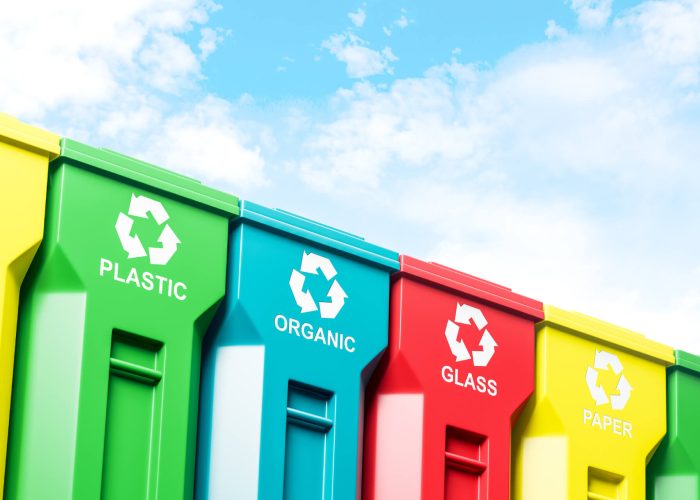
It’s time to ask for more from your waste management contractor.
One of the places that K-12 schools can greatly impact the environment and our future as a habitable planet is our handling of waste. We generate a lot! Paper, paper towels, food, and cafeteria waste — these types of items make up the bulk of our waste streams. With most of this going to landfills, except possibly recyclables, the environmental impact is huge.
Most districts have some kind of contract with a waste hauler to remove our solid refuse. Whether we realize it or not, the waste management industry is changing. Services are now available that weren’t only a few years ago. Considering the changing nature of the business, it
might be time for school leaders to ask for more from our waste management contractors.
Seeking Solutions
The Greendale School District did exactly that when they sent out a request for proposal (RFP) to waste management contractors. Specifically, the District sought firms that would be willing to work with them to reduce waste and save money. This RFP asked more from contractors than they had in the past. It clearly stated the school board’s goal of reducing waste costs “year over year by improving traditional waste collection with services that inform and influence school waste generation optimization through recycling, composting, process design and optimization.”
The RFP was very detailed and covered everything from the long list of items the District wished to recycle to other waste reduction options such as composting. Several years later, the work that was put into the RFP is beginning to take hold. Greendale had an established relationship with a provider who was willing to work with the District to continually find ways to reduce waste and expenses. After completing the process and working with the provider, here are some areas to consider when completing a bid process or taking quotes from a waste hauler.
Customizing Waste Pick Up
The amount of information and data that is possible through most waste removal contractors is very impressive. Schools should take advantage of these services so school leaders can better monitor its various waste streams.
Make sure to ask for weights and measures and regular reports from the vendor. This can include the weights of containers before pick up. A lot of waste collection trucks are now outfitted to provide weights at pickup. Reports can be generated by the vendor concerning waste composition, weights, and measures.
There are also new and inexpensive gadgets that can be placed in dumpsters to monitor the fill-level. The instrument uses wireless technology to report out how much waste a container holds. These kinds of tools can allow a district to easily monitor its waste and can also be used by the waste management contractor to collect waste more efficiently.
Another option is to ask for “right-sizing,” which is a system based on the weights or measures of the waste or recycling bin. Oftentimes, this allows waste pick-ups to occur less often, which can help the district avoid “tipping fees” or landfill fees. In some cases, containers may be downsized, which also can help reduce costs.

Educational Materials
When it comes to waste, everyone in your schools — teachers, staff, and visitors — all contribute. As busy as school leaders are, it’s a lot to ask them to provide educational materials regarding recycling or other efforts or strategies to cut down on a school’s waste.
Many waste haulers have excellent educational resources that can be used in schools to help educate staff and students, to help promote recycling, or explain how the waste is processed. Ask for signage, materials and recycling bins to help promote recycling and/or composting.
In some cases, providers will offer to host field trips for students to visit their facilities and see its new state-of-the-art recycling facility or to learn more about waste management.
Reducing Waste Stream
Educational materials can help your students and staff will recycle more materials, which can go a long way in cutting waste. However, even with recycling, schools are going to produce a lot of garbage, such as food scraps, that can’t be recycled.
Some waste management companies are beginning to offer composting services. Composting allows schools to collect food scraps, yard waste, and some paper products. Although composting services are still rare, make sure to ask your vendor if they are composting. It is likely that composting services will become more commonplace.
If your provider doesn’t provide composting, a separate composting service may be available. The Greendale School District engaged the services of a new start-up composter, the Compost Crusader, with the goal of reducing food waste and associated costs and to help pay the cost of composting. The Compost Crusader picks up the food waste and takes it to a processing facility. The finished product then goes to Wisconsin farmers to begin the cycle again. The composter can take paper towels, non-recycled paper, any compostable items, and food waste. Through composting, Greendale School District hoped to reduce their waste stream by as much as 75 percent.
Making It Happen
Asking more from your waste management provider is a great way to reduce your schools’ impact on the environment and maybe even lower expenses. If your district doesn’t have one already, it may be helpful to adopt a policy stating your board’s commitment to sustainability inside and outside of the classroom.
In some cases, simply asking for more from your waste management provider will go a long way in improving your service and reducing your waste. It’s important to be able to work with your provider. If you think of something else in regard to waste management, recycling, or composting, ask for it. If you don’t ask, you won’t get it.
About the Author




